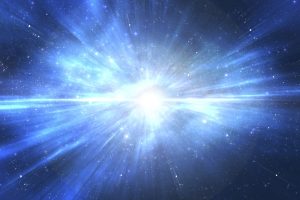it all came to be
It is an awesome wonder to consider the beginnings of space, time, and the universe within which we reside. Only a few are familiar with the theory of “the primeval atom,” first proposed by the Belgian physicist Georges Lemaitre, although most would recognize it today as the Big Bang.

The Big Bang
Even less well-known is that Lemaitre, in addition to being a physicist of some renown, was a Catholic priest, who in the 1930s was often seen strolling through the campus of the California Institute of Technology in Pasadena, California alongside Albert Einstein, in deep discussion of the cosmic consequences of their respective theories.
Although Lemaitre was an early supporter of Einstein’s theory of gravity, Einstein was initially skeptical of Lemaitre’s. By 1933, Einstein had become an enthusiastic proponent of Lemaitre’s theory of an expanding universe, stating that it was one of the most “beautiful theories he had ever heard”.[1]
Scientists have since been able to determine that there exists a common point of origin for all that the universe contains, and that there was indeed a moment, a singular instant when ALL the mass of the universe was compressed into such great density that it was smaller than a single atom. Imagine, all the substance (stars, planets, etc.) of the universe compressed into a microscopic particle of lint that lay resting somewhere upon a finger of God.
“Then God said, ‘Let there be light,’ and there was light.”[2] God caused the universe to come into existence with a single thought, filling it with light, in what has become known as the Big Bang. According to Steven Weinberg “it was light that then formed the dominant constituent of the universe,”[3] light which was a tad bit on the hot side, approaching the vicinity of a mere hundred trillion degrees Centigrade.
Often it is not what is explicitly stated that bears the greatest impact; rather it is what is implied that is of greater import. What has been most troubling to many scientists is that the Big Bang theory clearly implies a creation event, a moment when the universe came into existence. Dinesh D’Sousa writes, “Scientists call the starting moment of the universe a “singularity,” an original point at which neither space nor time nor scientific laws are in effect. Nothing can be known scientifically about what came before such a point. Indeed the term before has no meaning since time itself did not exist “prior to” the singularity. Once upon a time there was no time.”[4]
That God made the universe out of nothing, creating everything by his will and through his word alone, is a belief held by both Jews and Christians. No other religion claims that the universe was created from nothing. In fact, the ancient Greeks believed “ex nihilo, nihil” which loosely translated means from nothing comes nothing. Science has also determined that both space and time are inherent properties of the universe, something first proposed by Saint Augustine.
It is beyond comprehension, beyond our capacity to decipher how from a single thought it all came to be. The power and glory of God cannot be understood yet we see his handiwork all around us and that alone should cause us all to bend the knees in thanksgiving.
[1] John Farrell, The Day Without Yesterday.
[2] Gen 1:3.
[3] Steven Weinberg, The First Three Minutes.
[4] Dinesh D’Sousa, What’s So Great About Christianity.
